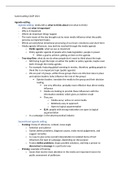Samenvatting CAOP 2021
Agenda-setting:
Agenda-setting: media tell us what to think about (not what to think)
- Who and what is important?
- Why is it important
- Where do important things happen
- The main issues of the day brought out by news media influence what the public
perceive as important topics
- Effects are peripheral (emotional processing of our brain: emotions) and short-term
- Media agenda influences: may both be reached through the media agenda
o Public agenda: what we see as important
o Policy agenda: agenda of people who make legislation, people in power
Often a goal to achieve, getting an item on the agenda
- Two-step flow: what do we do when people don’t want to think about the topic
o Still trying to get the topic on either the public or policy agenda, maybe even
both: through the media agenda
o For example: featuring global warming in movies, therefore, getting people to
think this is an important topic (public agenda)
o We are part of groups, within those groups there are informal rules in place
and opinion leaders (who influence the rest of the group)
Opinion leaders: translate the media to the group and their decision
making
Are very effective, probably more effective than direct media
influence
Media are looking to provide these influencers with the
information needed, which gives an indirect result
They are:
o Media-savvy: active on social media
o Relatively easy to approach
o Open to logical argumentation
ELM: people with strong motivation are open to logical
argumentation
o In a campaign: in the pharmaceutical industry
Second-level agenda setting:
- Framing: frame of reference, context, news angle
o Selection and salience
o Games define problems, diagnose causes, make moral judgements, and
suggest remedies
o Is a way to give some overall interpretation to isolated items of fact:
influences the type of campaign, depending on the purpose
o Frames define problems, shape possible solutions, and help a person to
deconstruct a message in a particular way
- Priming: example of framing
o Issues that receive most attention in the media are important factors for
public assessment of politicians
, o Issues are often associated with the things on which they have the strongest
reputation
o Making people ready to have a certain judgement: preparing the automatic
pilot, doesn’t actually make you feel the emotions
Preparing the brain for the desired processing of stimuli
Nurse is recognized more quickly if it follows doctor than after bread
Priming can occur following: perceptual, semantic of conceptual
stimulus repetition
Unconscious priming effects can affect word choice, behaviour,
choices, associations, emotions and recall of factual knowledge
For example, dramatic music before a scary occurrence in a movie
Artikel 1: If you blog, will they follow? Using online media to set the agenda for consumer
concerns on “greenwashed” environmental claims – Fernando, Suganthi & Sivakumaran
(2014)
Samenvatting: de agenda-setting theorie wordt gebruikt om de online meningen van
klanten over greenwashed advertentieruimte (misleidend) en of deze beïnvloed worden
door de agenda, bepaald door de online krantenartikelen en Ngo’s met focus op klimaat
te onderzoeken
Internet als onderzoek basis in persuasieve communicatie:
- Bron van consument opinie
- Onderzoeken van: interactiviteit, tijdloosheid en effectiviteit van de advertentie
- Interactiviteit: samenwerkingsgericht, consument is niet langer passieve ontvangers
maar creatieve ‘prosumers’
Agenda-setting theorie online: voor onlinemerkcommunicatie en online politieke
advertenties
- In dit artikel specifiek: de opinie van de consument tegenover greenwashed
advertenties
- Greenwashed: advertentie- en marketingclaims die het publiek misleiden over de
milieuvriendelijke waarden van een persoon, product of bedrijf
Onderzoeksvragen:
- OV1: Wat zijn de verschillende thema’s binnen discussies van belanghebbenden over
greenwashing in de media?
o Door middel van publieke discussies, blogs en nieuwsartikelen: content die
gegenereerd is door de gebruiker
- OV2: Heeft de agenda van Ngo’s of online kranten over greenwashing een effect op
de salience van greenwashing issues binnen discussies van de consument?
o Kijken naar de attributen of sub-issues van milieu
o Klimaat issues worden gezien als unobtrusive wat betekend dat de publieke
agenda erg gecorreleerd is met de media-agenda
, o Dit zou betekenen dat de media tot op sub-issue niveau de publieke agenda
over klimaat kan bepalen
- OV3: Beïnvloeden de discussies van consumenten over greenwashing de salience
van het greenwashing issue binnen Ngo en online kranten blogs en artikelen?
o Uit onderzoek blijkt dat het effect wederkerig is, de publieke agenda kan ook
de media agenda bepalen
Literatuuronderzoek:
- Agenda-setting theorie: massa media vertellen het publiek wat zij denken en
waarover (first level), maar ook hoe ze denken over issues, personen of objecten
(second level)
o First level: het plaatsen van salience op een bepaald issue
o Second level: het plaatsen van salience op een bepaald attribuut van een
issue van de ene agenda op de ander
De attributen kunnen substantive (cognitieve karakteristieken) of
affectief zijn (positief, negatief, neutraal)
o Intermedia agenda-setting: effecten gecombineerd van verschillende typen
media
- Greenwashing: sociale media hebben een rol gespeeld in het versterken van de
backlash tegen bedrijven die deelnemen aan greenwashing
- Conceptueel raamwerk en hypothese ontwikkeling:
o Online agenda-setting en Ngo’s: sociale media hebben dit makkelijker
gemaakt maar dit wordt vaak gebruikt als een verlengstuk van traditionele
media (one-way), niet als interactief medium voor belanghebbenden (two-
way)
o H1: saillant substantief greenwashing attributen van online
consumentdiscussies worden beïnvloed door de saillant greenwashing
attributen binnen milieugerichte Ngo-blogs
o Online agenda-setting en traditionele nieuwsmedia: de relatie is wederkerig
o H2: een bidirectionele agenda-setting relatie bestaat tussen online
krantenblogs en online consumentdiscussies, deze zullen elkaar beïnvloeden
in elkaars discussies
o H3: een bidirectionele agenda-setting relatie bestaat tussen online
krantenartikelen en online consumentdiscussies, deze beïnvloeden elkaars
discussies
Methode: thematische analyse/inhoudsanalyse
- Tekstuele content: identificeren, analyseren en rapporteren van patronen binnen
data die minimaal data organiseert en omschrijft in rijk detail
Resultaten:





